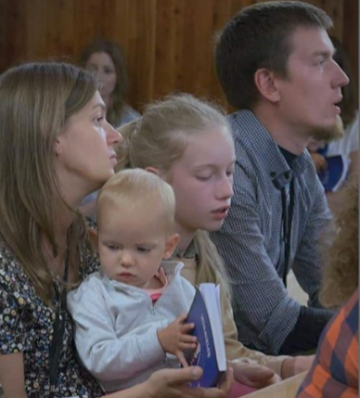Next to Christ in the Tabernacle, or wherever we find ourselves in our time of mental prayer, we will persevere out of love, when we are joyful and when it is difficult for us and when it seems to us that we are making little use of it. It will help us on many occasions to know that we are united to the praying Church in all parts of the world. Our voice is united to the cry that, at every moment, is addressed to God the Father, through the Son, in the Holy Spirit. At the hour of mental prayer, and also during the day," St. Josemaría Escrivá continues to tell us, "remember that we are never alone, although perhaps materially we find ourselves isolated. In our life... we are always united to the saints in Paradise, to the souls who are purifying themselves in purgatory, and to all our brothers and sisters who are still fighting on earth. Moreover, and this is a great consolation for me, because it is an admirable sign of the continuity of the Holy Church, you can unite yourselves to the prayer of all Christians of every age: those who have preceded us, those who live now, those who will come in the centuries to come. Thus, feeling this marvel of the Communion of Saints, which is an unending song of praise to God, even if you do not feel like it or even if you feel you are in difficulty - dry!
"Be filled with joy, thinking that our prayer is united to that of those who lived with Jesus Christ, to the unceasing prayer of the Church triumphant, purgative and militant, and to that of all Christians to come. Therefore (...), when you find yourself arid in prayer, make an effort and say to the Lord: My God, I do not want my voice to be absent in this choir of permanent praise addressed to You and which will never cease".
In daily prayer we find the origin of all spiritual progress and a continuous source of joy, if we make the effort and are determined to be "alone with the one we know loves us "8. The interior life progresses at the pace of prayer, and has repercussions in the actions of the person, in his work, in his apostolate, in his mortification?
Let us go frequently to St. Mary so that she may teach us how to treat her Son, because no person in the world knew how to address Christ as his Mother did. And next to her, St. Joseph, who spoke with Jesus so many times, while he was working, at rest, during a trip, while they were walking around Nazareth.... After Mary, Joseph was the one who spent the most hours with the Son of God. He will teach us how to treat the Master and, if we ask him, he will help us every day to make firm, concrete and clear resolutions that will help us to improve our work, to smooth out the rough edges of our character, to be more helpful, to be joyful in spite of all the contradictions that may arise?
Sancte Ioseph, ora pro eis, ora pro me! St. Joseph, pray for them (here we can fix our attention on the concrete persons for whom we wish to pray with particular intensity), pray for me.
